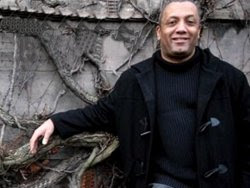
I grew up duck hunting with my father on the "Mississippi Flyway" shown to the right --a major migratory path for waterfowl, particularly ducks and geese. We did not know then that our "swamp" was really a wetland, or that there was a biological connection between climate and wetlands and waterfowl. Late in his life, my Dad learned some of those connections and found himself, much to my amusement, an arch-conservative, making common cause with liberal "green" organizations in the name of wildlife conservation.
A story in today's New York Times appears (see link above) about how climate change is impacting duck hunting in Missouri, and how hunters are beginning to see the light about climate change reminded me of that common cause and got me thinking about ecology and leadership.
Today I'm thinking again about how important it is for leaders in any field, but definitely in the church, to see the bigger picture of the ecologies--environmental, social, emotional and spiritual -- and to think like environmentalists about the future. In the article, a member of the UN Panel that shared the Nobel Prize with Al Gore is quoted with the idea that we can no longer effectively lead if we only have data from the past.
Often churches are stuck with information and traditions from the past with no sense of where they should go in the future. I believe we can only lead effectively if we can weave together what we know from the past and in the present with a faithfully imagined "trajectory" (to use Gordon Kaufman's term) for the future.
Or to continue the metaphor, in order to have our ducks properly aligned, we have to reformulate our approaches based on what's about to happen, not just what used to happen.























 “Hospitality” is strange and risky. Periodically, I stop to remember that the linguistic root for “hospitality,” as well as “host,” “hospital,” and “hospice,” was the Indo-European word ghosti. The contemporary words “ghost” and even “hostile” come from the same root because ghosti also referred to “stranger” as well as “guest” and even a “host of enemies” (Helen Luke, “The Stranger Within,” Parabola, Winter, 1990, p. 17). Deep within the word “hospitality” is a hint of fear and danger, slipping back and forth between comfort and risk. The encounter Abraham and Sarah had with the three strangers by the Oaks of Mamre (Genesis 18) describes this slippery and risky phenomenon. Desert rules required that hospitality be extended to strangers who approached the tents of a nomad. Note how the language of the passage shifts: first Abraham and Sarah are the hosts offering comfort and blessings and then almost instantly they become God’s guests and recipients of a challenge, a call to a new realm and a blessing. Henri Nouwen, in his book Here and Now, describes hospitality as creating a space for the guest to explore and develop in her own unique way. In a seminary that means the teachers and administrators start out by playing hosts, providing a safe and welcoming environment conducive to personal and intellectual exploration, and providing stimulating resources such as readings, lectures, discussions, assignments. If the faculty and staff insist that their own familiar agendas for the students take precedence over the students’ own unique and sometimes strange personal, spiritual and intellectual development, they diminish hospitality and miss the blessing. In a truly safe and open space guests and hosts trade places and the learners also teach and guide faculty and staff into new challenges, new realms, and new blessings. The more “strange” the students are, the more the seminary needs to extend risky hospitality and thereby unknowingly entertain angels (Hebrews 12:2).
“Hospitality” is strange and risky. Periodically, I stop to remember that the linguistic root for “hospitality,” as well as “host,” “hospital,” and “hospice,” was the Indo-European word ghosti. The contemporary words “ghost” and even “hostile” come from the same root because ghosti also referred to “stranger” as well as “guest” and even a “host of enemies” (Helen Luke, “The Stranger Within,” Parabola, Winter, 1990, p. 17). Deep within the word “hospitality” is a hint of fear and danger, slipping back and forth between comfort and risk. The encounter Abraham and Sarah had with the three strangers by the Oaks of Mamre (Genesis 18) describes this slippery and risky phenomenon. Desert rules required that hospitality be extended to strangers who approached the tents of a nomad. Note how the language of the passage shifts: first Abraham and Sarah are the hosts offering comfort and blessings and then almost instantly they become God’s guests and recipients of a challenge, a call to a new realm and a blessing. Henri Nouwen, in his book Here and Now, describes hospitality as creating a space for the guest to explore and develop in her own unique way. In a seminary that means the teachers and administrators start out by playing hosts, providing a safe and welcoming environment conducive to personal and intellectual exploration, and providing stimulating resources such as readings, lectures, discussions, assignments. If the faculty and staff insist that their own familiar agendas for the students take precedence over the students’ own unique and sometimes strange personal, spiritual and intellectual development, they diminish hospitality and miss the blessing. In a truly safe and open space guests and hosts trade places and the learners also teach and guide faculty and staff into new challenges, new realms, and new blessings. The more “strange” the students are, the more the seminary needs to extend risky hospitality and thereby unknowingly entertain angels (Hebrews 12:2).




